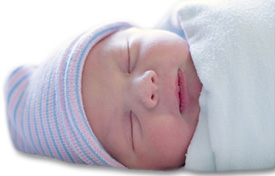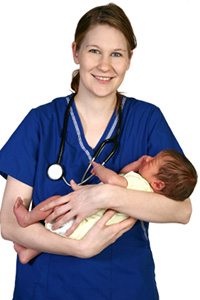Newborn Screening

Soon after birth, all babies born in the United States are checked for certain medical conditions. This is called newborn screening.
Importance of Newborn Screening
All babies are screened, even if they look healthy, because some medical conditions cannot be seen by just looking at the baby. Finding these conditions soon after birth can help prevent some serious problems, such as brain damage, organ damage, and even death.
For example, a test for phenylketonuria (PKU) checks if the baby’s body can process phenylalanine. Phenylalanine is found in most foods and can build up in the blood and tissues of a baby with PKU, resulting in brain damage. This can be prevented if a baby with PKU is put on a special diet early. Babies are also tested for hypothyroidism, which means that their bodies do not make enough thyroid hormone. Babies with hypothyroidism can take medication with the hormone to avoid the slowed growth and brain damage that can happen if their hypothyroidism is not treated.
Even though some conditions cannot be treated as easily as PKU and hypothyroidism, it is still helpful to know about the condition as soon as possible. For example, a baby with sickle cell disease is at risk for harmful infections. These babies can take a daily dose of penicillin, an antibiotic medicine, to help prevent infections. Although the penicillin will not change the fact that the baby has sickle cell disease, it can help prevent serious problems.

Congenital Hypothyroidism (CH) Video
Watch this Medscape video to learn about CH and the importance of newborn screening.
When and How Babies are Screened
Ten Significant Public Health Achievements ― United States, 2001-2010: Newborn Screening
 Improvements in technology and endorsement of a uniform newborn-screening panel of diseases have led to earlier life-saving treatment and intervention for at least 3,400 additional newborns each year.
Improvements in technology and endorsement of a uniform newborn-screening panel of diseases have led to earlier life-saving treatment and intervention for at least 3,400 additional newborns each year.
Babies that are born in a hospital should be screened before they leave the hospital. Parents should take babies that are not born in a hospital or those that were not screened before leaving the hospital to a hospital or clinic to be checked within a few days of birth. In some states all babies are screened a second time, about two weeks after birth.
Blood Test
A health professional will take a few drops of blood from the baby’s heel. The blood sample is sent to a newborn screening lab for testing.
Hearing Screening
Hearing screening is a short test to tell if people might have hearing loss. Hearing screening is easy and not painful. In fact, babies are often asleep while being screened. All babies should be screened for hearing loss no later than 1 month of age. It is best if they are screened before leaving the hospital after birth.
Learn more about hearing screening »
Screening for Critical Congenital Heart Defects
Babies with a critical congenital heart defect (CCHD) are at significant risk of disability or death if their condition is not diagnosed soon after birth. Newborn screening using pulse oximetry can identify some infants with a CCHD before they show signs of the condition. Once identified, babies with a CCHD can be seen by cardiologists (doctors that know a lot about the heart) and can receive special care and treatment that can prevent disability and death early in life.
Certain hospitals routinely screen all newborns for CCHDs. However, CCHD screening is not currently included in most state newborn screening panels.
Learn more about screening for CCHDs »
Conditions Tested
Each state runs its own newborn screening program. The conditions include sickle cell disease and other hemoglobin disorders, conditions where a child is unable to process certain nutrients (such as PKU), or conditions where there is a hormonal insufficiency (such as hypothyroidism). Most states screen for a standard number of conditions, but some states may screen for more. That means that there are differences in the screening process and the number and types of conditions included in screening in each state.
Baby’s First Test provides a current list of conditions included in newborn screening in each
state.
Screening Results 
If the results are "negative" ("pass" or in-range result) it means that the baby’s test results did not show signs of any of the conditions included in the screening.
If the results are "positive" ("fail" or out-of-range result) it means that the baby’s test results showed signs of one or more of the conditions included in the newborn screening. This does not always mean that the baby has the condition. It may just mean that more testing is needed.
The child’s doctor might recommend that the child get screened again or have more specific tests to diagnose a condition. For example, all babies who do not pass a hearing screening should have a full hearing test by three months and sometimes also at six months of age to confirm if there is a hearing loss.
Get Help!
If your baby’s newborn screening tests show that there could be a problem, work with your baby’s doctor to get any needed follow-up tests as soon as possible – don’t wait!
Finding and treating some of the conditions at an early age can prevent serious problems, such as brain damage, organ damage, and even death. Many of the conditions can be treated with medication or changes to the baby’s diet.
In order to make sure your baby reaches his or her full potential, it is very important to get help for any medical condition as soon as possible.
For More Information
Save Babies Through Screening Foundation
This site educates parents, pediatric healthcare providers, and policy makers about available comprehensive newborn screening.
CDC Feature on Newborn Screening
Learn more about CDC's newborn screening activities.
[English] [Spanish]
The Parent's Guide to Newborn Screening: These Tests Can Save Your Baby's Life
Information for parents about newborn screening from the Health Resources and Services Administration (HRSA).
Newborn Screening Tests
Information about newborn screening from the March of Dimes.
National Newborn Screening and Genetics Resource Center
Information and resources on newborn screening and genetics for health professionals, the public health community, and consumers.
Advisory Committee on Heritable Disorders in Newborns and Children
The Advisory Committee on Heritable Disorders in Newborns and Children advises the Secretary of Health and Human Services regarding the most appropriate application of universal newborn screening tests, technologies, policies, guidelines and standards for effectively reducing morbidity and mortality in newborns and children having, or at risk for, heritable disorders.
Genetic Alliance Collection of Newborn Screening Videos
As part of the Consumer Focused Newborn Screening projects, Genetic Alliance created a playlist that showcases a selection of introductory newborn screening videos from various individuals and stakeholder organizations.
Newborn Screening Translational Research Network (NBSTRN)
Information on newborn screening-related resources, education, and services for health professionals, the public health community, and consumers.
Public Health Grand Rounds on Newborn Screening: Improving Outcomes
The Public Health Grand Rounds is a monthly webcast created to foster discussion on major public health issues. Related Article: Morbidity and Mortality Weekly Report on CDC Grand Rounds: Newborn Screening and Improved Outcomes
Baby's First Test
Baby's First Test provides information about newborn screening at the local, state, and national level and serves as the clearinghouse for newborn screening information. This website from Genetic Alliance is dedicated to educating parents, health professionals and the public about the newborn screening system.
Contact Us:
- Centers for Disease Control and Prevention
National Center on Birth Defects and Developmental Disabilities
Division of Birth Defects and Developmental Disabilities
1600 Clifton Road
MS E-87
Atlanta, GA 30333 - 800-CDC-INFO
(800-232-4636)
TTY: (888) 232-6348
New Hours of Operation
8am-8pm ET/Monday-Friday
Closed Holidays - cdcinfo@cdc.gov


